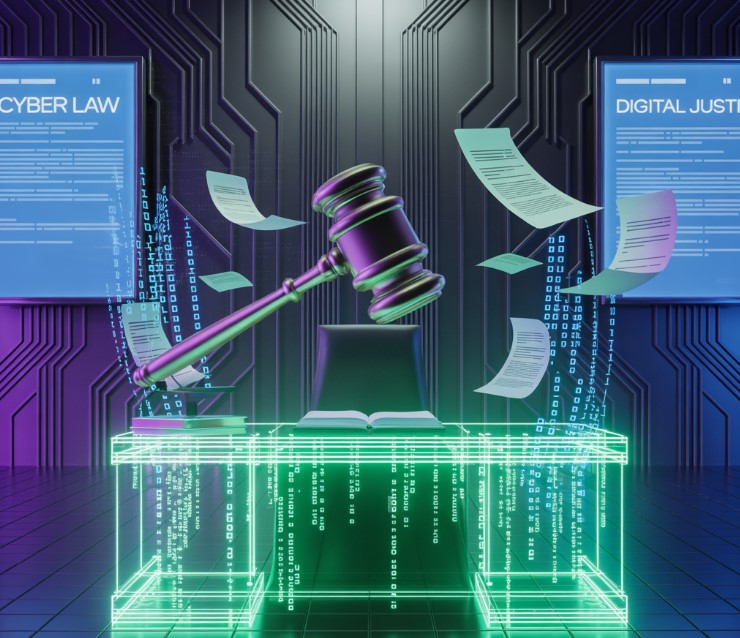Digital transformation has reshaped communication, business, education, governance, and personal interactions in ways that demand structured legal oversight.
Rapid expansion of online activity has introduced challenges tied to security, privacy, and accountability.
A surge in cyber threats, growing dependence on data systems, and rapid progress in digital technologies have collectively positioned cyber law as the fastest-growing legal field across the world.
Growing digital activity requires legal systems capable of safeguarding data, reinforcing trust, and setting boundaries for responsible digital conduct.
Cyber Law’s Integration with Emerging Technologies

Rapid innovation in technology continues to reshape digital interactions, creating complex legal questions that demand specialized knowledge.
Artificial intelligence, blockchain systems, and digital finance tools influence society at a speed that outpaces traditional lawmaking.
Cyber law serves as a framework that helps regulators address risk while still encouraging innovation.
Ned Capital News offers executive-level insights on how technologies like AI and blockchain are influencing boardroom governance, compliance strategy, and leadership readiness, especially for non-executive directors and finance professionals adapting to fast-evolving regulatory landscapes.
Artificial Intelligence and Blockchain
Artificial intelligence introduces legal concerns tied to fairness, oversight, and safety.
Automated decisions influence employment, credit scoring, healthcare access, and public services.
Poorly designed systems may produce biased outcomes or cause harm without clear accountability. Cyber law helps clarify responsibility, transparency expectations, and regulatory boundaries.
Blockchain systems influence digital contracts, authentication, privacy expectations, and verification processes.
New debates arise regarding regulation, fraud prevention, jurisdiction, and consumer safeguards.
Legal practitioners must interpret how decentralized systems interact with national laws.
Digital Assets and Fintech

Digital finance expands rapidly across global markets.
Cryptocurrencies, tokenized assets, and decentralized finance platforms attract new users but also introduce risks.
Strong legal structures are essential to prevent fraud, manage taxation, and ensure consumer protection.
Key areas requiring legal input include:
- Licensing and compliance for crypto exchanges
- Anti-money laundering controls
- Cross-border financial activity
- Dispute resolution involving digital assets
Governments worldwide continue shaping standards for digital finance, increasing demand for experts who can interpret and apply these rules.
Career Opportunities in Cyber Law
Growing complexity across digital systems has created strong demand for cyber law professionals.
Careers now stretch across corporate, governmental, and investigative fields.
Law students and early-career professionals with technical awareness hold a strong advantage, as organizations seek talent capable of adapting quickly to change
Roles in high demand include:
- Cybercrime investigator
- Data protection officer
- IP and e-commerce legal counsel
- In-house compliance and privacy lawyer
- Cybersecurity consultant
Drivers Behind the Growth of Cyber Law

Growing dependence on digital systems has created new pressures for lawmakers, regulators, and organizations.
Rising incidents of online crime, heightened concern about privacy, and rapid advancement in technology all contribute to unprecedented demand for cyber law expertise.
Expanding risks create an environment in which legal professionals must interpret new threats, set standards, and support accountability across digital activity.
Explosion of Cybercrime
Rising levels of cybercrime have pushed governments and institutions to rethink traditional policing and regulatory approaches.
Criminal activity in digital spaces moves quickly, escapes national borders, and often targets personal data or vital infrastructure.
Such rapid escalation has turned cyber law into a crucial force for accountability and public protection.
A range of criminal behaviors fuels this shift. These include:
- Phishing attempts that trick individuals into revealing confidential information
- Ransomware attacks that lock systems until a payment is made
- Identity theft incidents that exploit personal credentials
- Cyberstalking cases that use digital tools to harass or intimidate victims
Legal responses often lag due to the complexity of digital tools used in crimes.
Growing sophistication of attackers amplifies this problem, prompting greater reliance on specialized experts capable of navigating digital evidence, cross-border disputes, and victim protection frameworks.
Cyber law offers pathways for enforcement, clearer victim rights, and penalties designed to discourage further harm.
Heightened Importance of Data Privacy
Modern societies rely on vast amounts of digital information. Personal data fuels commerce, government services, communication tools, and online platforms.
The growing economic value attached to data has intensified concerns regarding misuse, unauthorized sharing, and security failures.
Regulatory systems have begun to respond with strong privacy rules. Examples include:
- GDPR in the European Union
- UK GDPR
- India’s pending Personal Data Protection Bill
Mishandling sensitive data leads to lawsuits, fines, damaged reputations, and public distrust.
Rising regulatory pressure has pushed businesses to seek legal guidance on consent systems, data retention, cross-border transfers, and risk mitigation processes.
Legal professionals with expertise in privacy compliance now play a central role in organizational governance.
Cybersecurity as a Legal Imperative

Cybersecurity has expanded far past the confines of IT departments.
Corporate leaders now view it as a legal priority that influences investor confidence, customer trust, and long-term business health.
Security breaches often trigger investigations, lawsuits, regulatory scrutiny, and financial penalties.
Organizations require legal oversight in several areas:
- Encryption standards and lawful access protocols
- Breach response procedures
- Incident reporting obligations
- International compliance requirements
- Contractual risk allocation with vendors and partners
Growing digital threats create a constant need for legal counsel who can interpret regulations, advise on risk measures, and support organizations during crisis events.
Cyber law professionals help bridge the gap between technical security practices and legal accountability.
Global and National Demand Trends
Expansion of cyber regulation across major regions has driven sustained demand for legal expertise.
Countries and economic blocs continue to introduce new rules aimed at protecting citizens, strengthening commerce, and preventing cybercrime.
Key trends include:
- India’s IT Act 2000 and upcoming privacy legislation creating continuous need for cyber specialists
- UK and EU commitment to strong privacy and digital governance through GDPR and related regulations
- S. demand for professionals skilled in cybersecurity compliance, AI oversight, breach litigation, and corporate advisory work
Growing global dependence on digital systems ensures that cyber law will maintain strong relevance in public policy, business strategy, and regulatory practice.
Summary

Cyber law intersects with technology, ethics, public safety, and policy in a way that no other modern legal field matches.
Continuous innovation across AI, finance, automation, and digital communication will introduce greater legal complexity in the years ahead.
Cyber law is positioned to guide societies through safer digital interactions, stronger regulatory structures, and responsible technological growth.
Law students and professionals are encouraged to consider cyber law for its relevance, impact, and long-term career potential.

